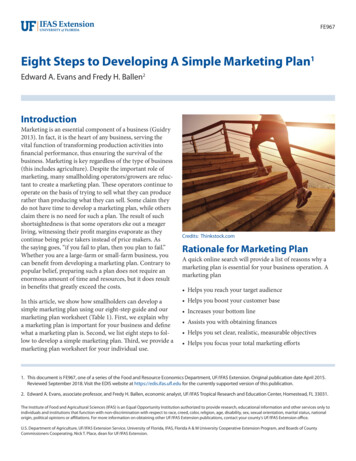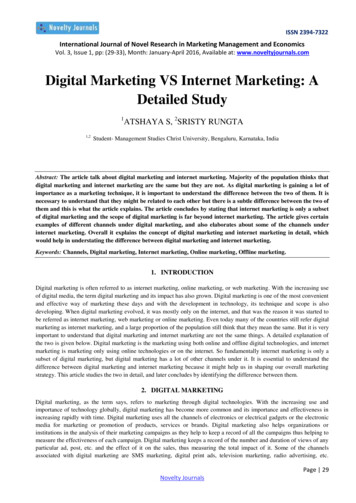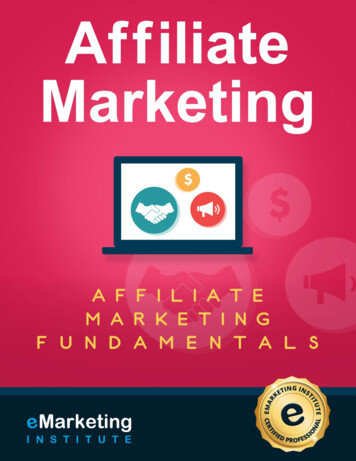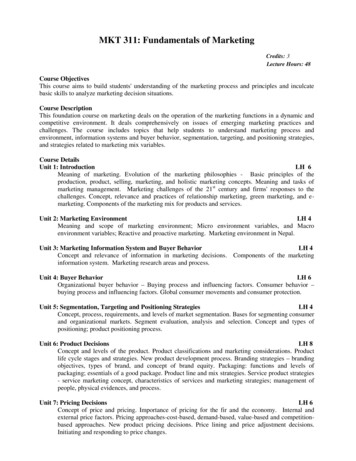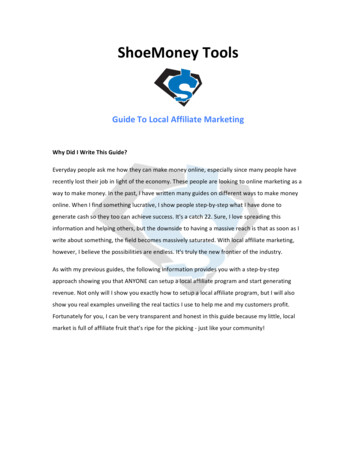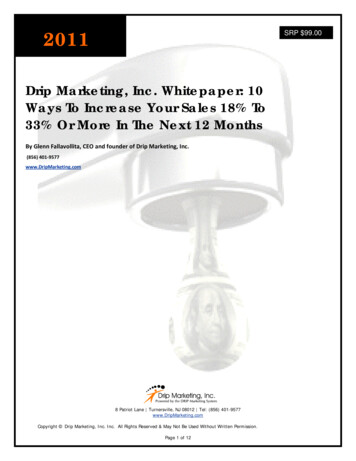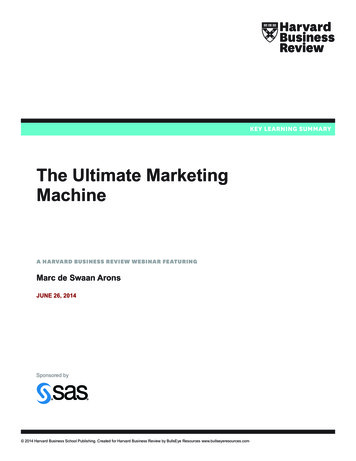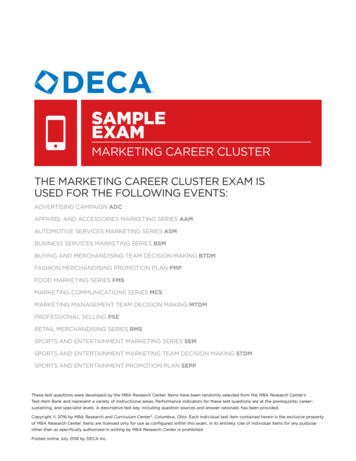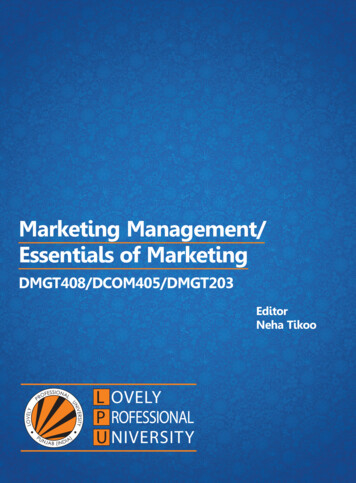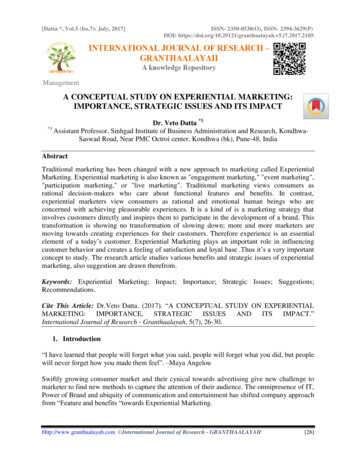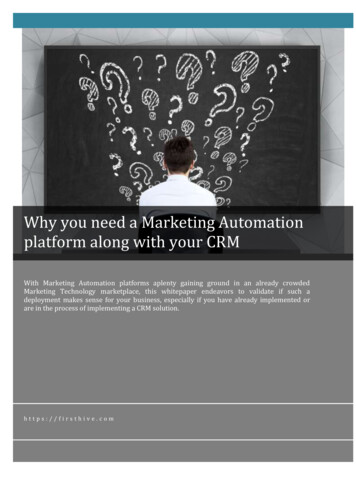
Transcription
Why you need a Marketing Automationplatform along with your CRMWith Marketing Automation platforms aplenty gaining ground in an already crowdedMarketing Technology marketplace, this whitepaper endeavors to validate if such adeployment makes sense for your business, especially if you have already implemented orare in the process of implementing a CRM solution.https://firsthive.com
Table of ContentsINTRODUCTION3EVOLUTION OF CRM AND MARKETING AUTOMATION PLATFORMS4THE CROWDED MARKETING TECHNOLOGY SPACE5WHY MARKETING AUTOMATION?7ISN’T CRM ALONE ENOUGH?9A MATCH MADE IN HEAVEN?11https://firsthive.com2
IntroductionMore often than not we are asked, why should we invest in a marketingautomation platform, especially since I have already invested or am planning toinvest in a CRM deployment for my organization. On the face of it, this is a veryinteresting question, since most CRM platforms have a marketing module as anadd-on available.But what Peter Dicken first wrote several decades ago in his book Global Shiftcontinues to hold true today:“ technology in, and of, itself does not cause particular kinds of change. It is,essentially, an enabling or facilitating agent.”In this white paper, we endeavor to explore the various scenarios under whichinvesting in a Marketing Automation, over and above a CRM solution, makessense for your business.https://firsthive.com3
Evolution of CRM and Marketing Automation platformsBefore we get into the crux of this whitepaper, it may be pertinent to understandthe way marketers have adopted the two technologies for their requirements.CRM systems have existed in some form for over a couple of decades now, butmarketing automation platforms are the newer kids on the block, so to speak.CRM platforms evolved from the ‘Database Marketing’ construct prevalent in the1980s, having evolved into ‘Relationship Marketing’ and ‘Account BasedMarketing’ based constructs of the 1990s. From there, the onus moved to settingup relationships with individual customers, which led to the earliest versions ofthe Customer Relationship Marketing (CRM) systems we are used to CustomerRelationshipMarketingSocial CRMHowever, in this entire journey, the entire onus was still on transactions, wherethe key triggers for any activity or milestone were transaction based. Companiesare evolving to recognize that they need a means to track and influence theinteractions that precede the intended transactions. The focus thus has movedfrom a workflow management system that aligns with company centricprocesses to being more open and customer process oriented. In terms ofchannels as well, while traditional CRM systems were limited to few predefinedsales channels, social CRMs are more in tune with customer defined dynamicchannels. Rather than the traditional push message based communication, theentire focus moved to customer initiated communication. This marks afundamental change in the way most organizations were attuned to do business.With Inbound Marketing gaining traction, many organizations started modifyingtheir processes so that customers could start reaching out to them instead of theother way around, which was the norm. As Inbound Marketing gained ground,marketers were faced with a challenge around how to deal with the complexitythat came with managing the multitude of dynamic channels around Inbound.Traditional CRM systems struggled to keep pace with the changing and dynamicchannels that customers were using to connect with the brands.In this background, technologies like Marketing Automation platforms came intothe picture.https://firsthive.com4
The crowded Marketing Technology spaceThe Annual Marketing Technology Landscape report published by ChiefMartecshowcases 3,874 Marketing Technology (MarTech) players in 2016, globally.The number of MarTech players have been doubling year on year, on an average.In this scenario, the choice of a right partner is of paramount importance forbrands across the spectrum.A major reason for this crowded market space is the increasing acceptance andadoption of such platforms by marketers, across the globe. IDC forecasted themarketing technology spends to exceed 32 Bn annually by 2018. The tablebelow showcases an excerpt from a 2015 research where over 80% of marketersdid not dispute the benefits that could be accrued by a Marketing Automationplatform, and had already implemented or had plans to implement a platform intheir organization.https://firsthive.com5
https://firsthive.com6
Why Marketing Automation?Marketing Automation is being implemented by companies of all sizes, across thespectrum. Having said that, there is however a clear bias shown by largerorganizations (over 500 Mn in annual revenues). Larger organizations are usingMarketing Automation as a ‘feed’ to their CRM platforms, while smallerorganizations are using the Marketing Automation lead management modulesfor their CRM requirements.Plenty of organizations implementing Marketing Automation realizedincremental revenue by driving relevant and engaging messaging and content fortheir customers, while most found it valuable for better lead management.Source: B2Bmarketing.net and Circle Research “Benchmarking Report Marketingautomation” (2015)An overwhelming majority of such organizations realized the benefits ofMarketing Automation within the first year.https://firsthive.com7
Ideally, Marketing Automation software would be beneficial to your organizationif: There are a large number of prospects generated by your businessYour sales team needs a constant source of leads to feed their funnelYour brand/ business has multiple lead generation sources likenewsletter subscriptions, events and tradeshows, customer contacts, etc.that you wish to driveYour brand receives a decent number of prospects that can potentiallyadd to your sales funnelIf your brand is involved in selling of a product or service that acustomer/ prospect is likely to research across multiple sources beforemaking a purchase decisionYour team performs a lot of marketing tasks like sending out mailercommunication manually, whereby their time usage could be optimizedby automating such taskshttps://firsthive.com8
Isn’t CRM alone enough?In today’s competitive market, most businesses will definitely benefit from anoptimal CRM implementation. But CRM systems typically are not capable ofhandling the complexities brought about by a multitude of channels, and havelimited lead scoring capabilities at best. Because of the genesis of the platforms,CRM systems are also attuned to captured transactions rather than interactionsacross channels, which Marketing Automation platforms are competent tocapture and analyze.Most CRMs also would only have basic email or SMS marketing capabilities,while Marketing Automation platforms would provide comprehensive campaignbuilding and execution functionalities, to drive and track higher conversions. Inaddition to the website tracking features that are standard on most MarketingAutomation platforms today, these act as a strong case builder for investment inMarketing Automation for your business, even or rather especially if you have aCRM platform deployed.Ideally, Marketing Automation software in addition to a CRM platform would bebeneficial to your organization if: Your sales team is responsible for maintaining existing business andgenerating new leads Your sales team manages a moderate to large number of customers andprospects Your customers research online before making a purchase decision You have an active online presence across your website and social mediachannels for interacting with customers and prospects You would like to conduct Cohort Analysis or similar behavioralsegmentation on your data set You are looking to drive higher conversions and ROI from your marketingspendsThis obviously comes with a qualifier - Neither CRM nor a Marketing Automationsolution will entirely solve a company’s particular problems simply by virtue ofbeing implemented. Hence is it imperative you choose a right partner specific toyour processes and business problems and objectives.https://firsthive.com9
https://firsthive.com10
A match made in heaven?To put it simply, Marketing Automation is ideal for companies looking tooptimize the top of the funnel while CRM systems are more suited for companieslooking to optimize the end of the funnel. Marketing Automation acts as themarketing complement to your CRM platform. CRM systems capture your salesdata but the task of engaging with your prospects within triggeredcommunication framework lies with Marketing Automation. CRM defines yourstrategy but Marketing Automation would embed the strategy and also driveexecution.The choice of the right Marketing Automation platform however is dependent onyour business.Moreover, in a B2C environment when you are dealing with hundreds ofthousands of leads any given day, a B2B system may not be the ideal platformyou would want to rely on, and you would be better off looking for a B2CMarketing Automation platform than a typical B2B Marketing Automationplatform. But that is a topic for another white paper.https://firsthive.com11
FirstHive is a proprietary, patent pending, SaaS based cross channel marketingplatform. Some of the world’s largest brands are using FirstHive to drive theirsales and marketing objectives. FirstHiveTM is an all-in-one marketing platformthat the marketers get access to; enabling them to put forward and execute veryfocused, customer centric marketing strategies.FirstHive enables the enterprises to get a 360 degree view of each individualcustomer of theirs. It does so by capturing the interactions of the customersacross channels, analysing the interaction data and providing intelligentconsumer and business insights to the brands. It brings in multiplefunctionalities to help solve business problems – Data capture and management,analytics, campaign management, digital marketing, inbound marketing, andsocial media management. While traditionally this product was exclusive to thedomain of very large global brands, with the launch of the Beta of the FirstHiveDIY (Do It Yourself) product in the year 2016, the same technology is nowavailable for SMBs globally. Copyright 2016. All rights reservedhttps://firsthive.com12
Marketing Automation acts as the marketing complement to your CRM platform. CRM systems capture your sales data but the task of engaging with your prospects within triggered communication framework lies with Marketing Automation. CRM defines your strategy but Marketing Automation would embed the strategy and also drive
